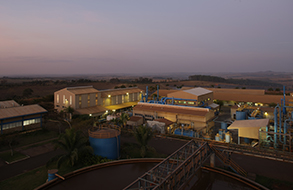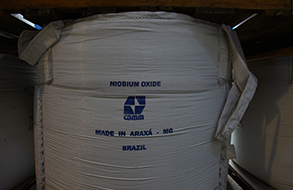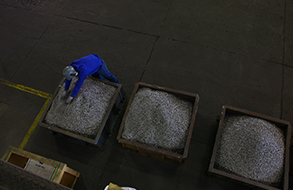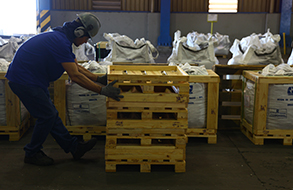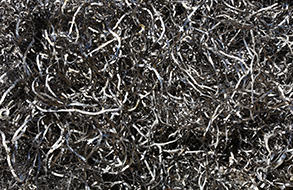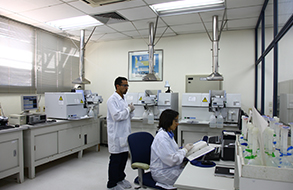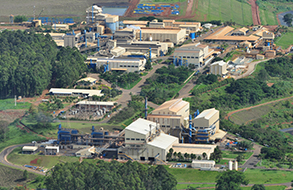CBMM: Growing ferronioibum demand in the world
----Interview with Adalberto Parreira
Commercial Director
CBMM
- CBMM (Companhia Brasileira de Metalurgia e Mineração) is the world leader in production and supply of niobium products and was founded in 1955 in Araxá, Brazil. It's headquartered and controlled in Brazil, selling globally industrialized niobium products, mainly used by the automotive, infrastructure and oil & gas sectors. By investing in niobium processing technology and applications, in addition to its supply experience for clients located in more than 50 countries, CBMM contributes directly to the sustainable development of industry and society.
- Asian Metal: Hi Adalberto, could you please introduce your company in brief?
- Adalberto: CBMM (Companhia Brasileira de Metalurgia e Mineração) is the world leader in production and supply of niobium products and was founded in 1955 in Araxá, Brazil. CBMM's sales volume increased 26% in 2018. In 2019 the forecast is to increase 12% due to the continuous progress of microalloyed steels and the evolution of FeNb addition (g/ton) in all steel market segments in which we operate (especially energy, automotive and infrastructure), apart from additional applications out of the steel industry.
- Asian Metal: Is there any news about the ferroniobium supply in Brazil?
- Adalberto: Brazil is the largest niobium supplier in the world, providing around 90% of all niobium products available in the market. However, niobium is not scarce and there are several reserves in the world, such as in Russia, USA, Australia, Canada and the African continent. The matter regarding niobium is not resource availability but the market size. What puts Brazil in this leading position in the niobium market is the technology being developed since the 1960s by CBMM.
- Currently we are finishing a phase of the production capacity expansion process. In 2019, we are going to invest 450 million Reais (around 110 million US Dollars) in Araxá′s industrial plant expansion in order to, by the end of 2020, be able to produce 150 thousand tons of ferroniobium.
- We have already in mind that the next step will be to expand up to 250 thousand tons if we keep growing around 10% per year by 2021. Thereafter, the plan is to increase ferroniobium production initially to 210 thousand tons/year, a plan that is still under evaluation but in which we are working in a realistic way. It will be an investment of at least 3 billion Reais (around 750 million US Dollars), which we expect to be approved by the board by the end of 2020. Capacity expansion is closely linked to market expansion, in which we keep persevering and investing.
- Asian Metal: As the demand for ferroniobium from downstream consumers has increased greatly since last Q4, what will you do to satisfy the increasing demand?
- Adalberto: We have the strategy to always be capable to supply all the niobium global demand. This helps to explain why we are already investing to increase our production capacity to 150 thousand tons of ferroniobium until December 2020, at the same time we are planning a further expansion to 210 thousand tons.
- We are in a pace to produce 110 thousand tons this year, generating the opportunity to increase our inventory levels, even considering our expected sales growth in 2019. For 2020 our plan is to reach 120 thousand tons of production, capturing the partial sinergy of the investments we are already doing for expansion.
- We understand that our long term perspective combined with the strategy to always be ready to supply the market growth (both parts of the CBMM’s DNA), helps to explain customers our orientation and commitment to support the technical program.
- Asian Metal: Can you tell us something about the demand in ferroniobium market in South America?
- Adalberto: South America′s demand for ferroniobium is booming in 2019, driven by the surge of Brazilian steel export levels to other regions such as the USA, as well as the increase in domestic demand in Brazil. In YTD up to May, we observed a 9% growth in FeNb sales in Brazil. For South America as a whole, selling growth was 11% higher than 2018's.
- Asian Metal:?As the vanadium prices continue to increase in the international market, do you think the niobium prices will increase accordingly? How about the future trend?
- Adalberto: We do not see a direct dependency ratio between prices of vanadium and niobium. These elements offer different properties but supply some sectors in common. On an annual basis in 2019, our estimate is that only about 4,000-6,000t of niobium sales in China may come from replacing vanadium by niobium additions or a compound of both, especially long steel producers, specifically for rebar production.
- We see a great potential in expanding microalloying elements in rebars, because the elements compound (Niobium alone or in combination with other elements such as vanadium and titanium) provide resistance to the steel with a more homogeneous structure. The new Chinese policy aiming higher quality level products should speed up the replacement of traditional carbon steel grades by microalloyed steels.
- In general, niobium has a more stable price, which is valued by our markets. This requires plenty of consistency in quality, availability of products, client relationships and values our franchise of co-development, technical support and innovation.
- Asian Metal: What are your advantages and disadvantages compared with other ferroniobium plants in the world?
- Adalberto: Our work is focused on maintaining a long-term relationship with our clients. We invest in the dissemination of niobium technology alongside our clients and end users, as well as have a team of first-rate technicians focused on process improvement and development of products and new applications.
- Logistics is also essential to maintain an efficient customer service and it stands out as one of CBMM's competitive differentials. In addition to three commercial subsidiaries and one representative office, the Company keeps its products in an extensive network of outsourced warehouses, strategically positioned to serve clients around the world. Deposits keep enough stocks to meet clients immediate needs, ensuring access to an uninterrupted flow of high quality products. For clients in Europe, for example, we work with a delivery time of 48 hours after an order is placed.
- Asian Metal:?How about your plan of the future development about the ferroniobium business?
- Adalberto: In addition to greater consumption of ferroniobium provided by the worldwide surging demand for high value-added steels, we are also seeing the growing use of niobium beyond traditional steel applications, especially new applications with compound annual growth rate (CAGR) projected above 10% in a ten-year period. We believe that emerging technologies using niobium oxide, for example, are likely to bring significant evolution with new applications.
- The company has been investing exponentially in solutions for the automotive and energy sector. Especially automotive electronic systems, in which niobium nanocrystals play a key role in noise reduction systems integrated onto onboard entertainment systems (infotainment). Without such noise reduction systems, magnetic interference between components would be common, leading to disruption in operation or even serious safety problems. The current trend of electronic systems with higher frequencies and smaller sizes makes increasingly important to develop nano-crystalline materials containing niobium with higher electrical properties that meet these new standards and requirements.
- For automotive parts, CBMM has developed the Al-Nb-B grain refinement alloy, which has been tested around the world with promising results in wheels and engine cylinder heads. Using niobium in aluminum as a grain refiner of aluminum-silicon cast alloys has already been proved as being really relevant for higher metallic yields in aluminum casting, providing a more homogeneous structure. Grain refinement makes it possible to create auto parts with more complex geometries and thinner foils, with a high degree of integrity and homogeneity. It thus reduces the waste rate from defective components as well as the amount of return material on production, apart from improving the mechanical properties of resistance and stretching, which is the key for projects with lighter, durable and safe structures.
- In partnership with Toshiba Corporation, CBMM is currently working on the development of lithium batteries using niobium and titanium (NTO) mixed oxide anodes. The contract signed by the Brazilian company and the Japanese giant foresees a new generation of batteries that features durability, safety and ultra fast recharge, three current claims of the automotive industry given the growing demand for electric vehicles. The use of niobium in this technology enables safer and more durable batteries, maintaining its capacity to store energy with record number of cycles. Another point of interest of the automotive industry nowadays is about niobium application is in NCA and NMC automotive batteries. It is to be proven that niobium works stabilizing nickel reducing the need of cobalt which is a concern in this industry.
- Niobium is also present in nickel-based superalloys used to build aeronautical engines. In 2017 CBMM launched a specific laboratory for these materials, that looks for niobium based solutions to increase the resistance of turbine components and provide them greater durability and efficiency.
- Asian Metal:?As China is still a big consumer for ferroniobium, do you think it will influence the global market? Do you plan to enlarge the supply to Chinese market in the future?
- Adalberto: The growth projection for the coming years in China is driven by the energy and mobility segments (solutions mentioned in the answer to the previous question).
- In the structural steels segment (construction and infrastructure), we observe and project growth in sales of niobium in flat steels as well as sections, with the improvement of more sustainable standards in buildings, demanding more resistant steels. We also see the potential for advancement in rebars in China, where 47% of production still don't use microalloying elements (of that amount, we estimate that only 33% might still use. The remaining 14% have no reason to become microalloyed steels).
- We see a great potential for expanding the use of microalloys in rebars, since the combination of niobium with other elements (such as vanadium and titanum) provides more resistant steel with more homogeneous structure. The inspections China will implement this year on its steelworks (based on the new rebars rule) should speed up the replacement of traditional carbon steels by microalloyed steels.
- Asian Metal:?What do you expect about the total consumption volume of ferroniobium in 2018? How about the volume in 2019? Do you think it will continue to increase?
- Adalberto: Ferroniobium world market registered a growth of 20% in 2018 compared to 2017. CBMM had one of the best economic and financial results in its history in 2018, a 26.04% increase in ferroniobium volume sales and net income of US$ 2.015 billion, 33% up from the previous year. This performance is a direct outcome of the strategy adopted since the start of the Company's activities, to spread and develop the niobium market based on the execution of a technology program, as well as the increasing demand for niobium in the world.
- The Company has grown in all segments in which it operates: structural, automotive, stainless and oil and gas. It is worth observing that the diversification of ferroniobium sales out of the steel industry accounted for about 3,500t of sales in 2018, applied in market niches still at the beginning of their life cycle, which have growth rates much higher than those projected for the steel industry.
- In 2019 we estimate the world market size for Niobium products at about 130 thousand tons/year (in the 1960's it was one thousand tons/year), being 120 thousand tons in form of ferroniobium. Regarding CBMM, the forecast is to grow 12% due to the continued advancement of microalloyed steels and the evolution of FeNb addition (g/ton) in all steel segments in which we operate (with emphasis on energy, mobility and infrastructure ), apart from other applications out of the steel industry.

